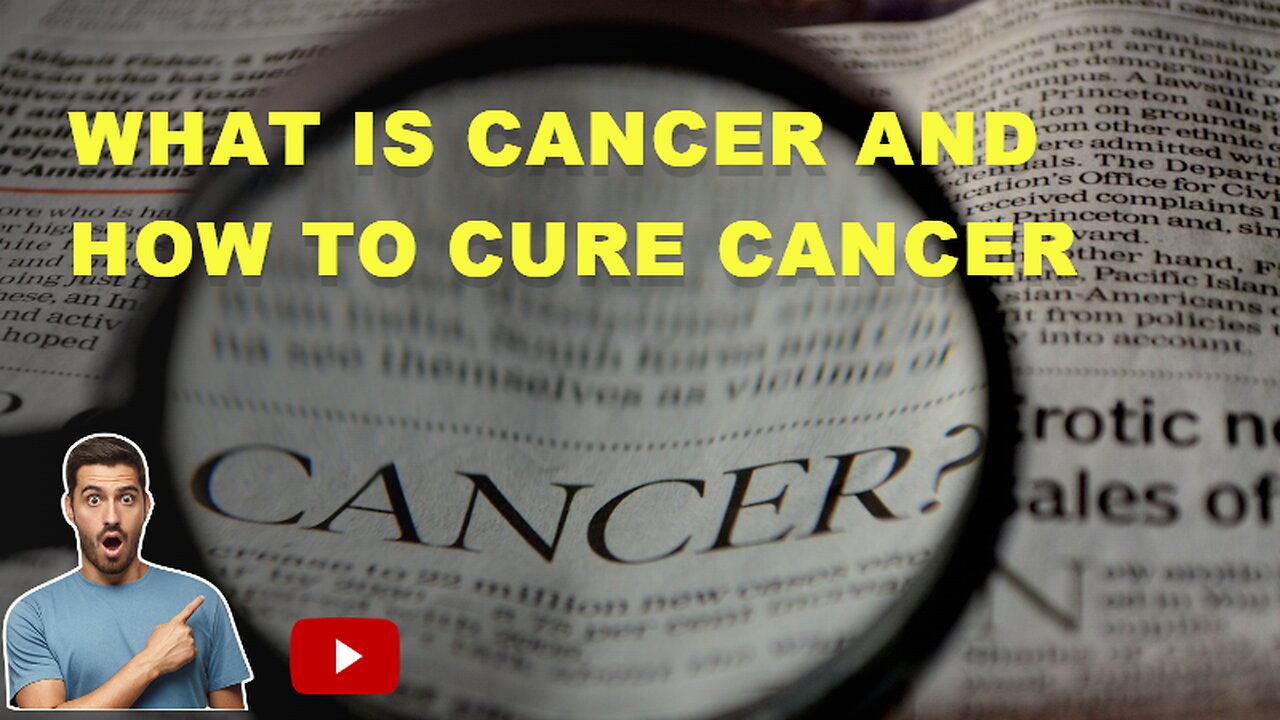Premium Only Content

What Is Cancer? What Causes Cancer & How Is It Treated? | Cancer Unveiled A Comprehensive Guide
What Is Cancer? What Causes Cancer & How Is It Treated?
Cancer Unveiled A Comprehensive Guide 2023
Cancer Treatment: Chemotherapy
Robotic Lung Cancer Surgery | Inside the OR
Cancer Cells Undergoing Mitosis
How to detect the deadliest form of cancer
This Revolutionary Treatment Kills Cancer From the Inside Out
3D Medical Animation - What is Cancer?
Sneaky symptoms of testicular cancer
Warning signs of prostate cancer
New York Doctor Spots Cancer on Woman During HGTV Appearance
Cancer is a group of diseases characterized by the uncontrolled growth and spread of abnormal cells in the body. These abnormal cells are known as cancer cells, and they can invade nearby tissues and organs, disrupt their normal functioning, and even spread to other parts of the body through the bloodstream and lymphatic system in a process called metastasis.
Cancer can occur in virtually any part of the body and may develop from different types of cells. There are more than 100 different types of cancer, each with its own unique characteristics and behaviors. Some of the most common types of cancer include breast cancer, lung cancer, prostate cancer, colorectal cancer, and skin cancer, but there are many others as well.
The development of cancer is typically a multi-step process involving genetic mutations that disrupt the normal regulatory mechanisms controlling cell growth and division. These mutations can be caused by a variety of factors, including:
Genetic predisposition: Some individuals may inherit genetic mutations that increase their risk of developing cancer.
Environmental factors: Exposure to carcinogens (cancer-causing substances) such as tobacco smoke, certain chemicals, radiation, and some infections can increase the risk of cancer.
Lifestyle factors: Poor diet, lack of physical activity, excessive alcohol consumption, and obesity are known risk factors for certain types of cancer.
Aging: Cancer is more common in older individuals, as accumulated genetic mutations over time can increase the risk.
Cancer can be a devastating disease, but advances in medical science have led to improved understanding, prevention, early detection, and treatment options. Treatment modalities for cancer include surgery, chemotherapy, radiation therapy, immunotherapy, targeted therapy, and precision medicine, among others. The choice of treatment depends on the type and stage of cancer, as well as the patient's overall health.
Regular cancer screenings, a healthy lifestyle, and risk-reduction strategies are important for cancer prevention and early detection, which can greatly improve the chances of successful treatment and long-term survival.
-
 DVR
DVR
Simply Bitcoin
2 hours ago $0.24 earnedHe Wasn't Meant To Say This: Bitcoin Hits $1M in The Next 48 Months! | EP 1202
2.03K -
 34:25
34:25
CryptoWendyO
45 minutes agoHUGE REASONS XRP AND ETHEREUM COULD PUMP TO NEW HIGHS IN MARCH
1 -
 53:54
53:54
The Dan Bongino Show
4 hours agoBitter Dems Move To Shutdown Government (Ep. 2441) - 03/13/2025
498K1.06K -
 56:37
56:37
Grant Stinchfield
2 hours ago $1.49 earnedNational Security Put at Risk... Biden Personal Emails Discovered Containing the Unthinkable!
15.4K1 -
 3:12
3:12
Gun Drummer
1 day agoMetallica - Enter Sandman GUN COVER
654 -
 14:59
14:59
BEK TV
3 hours agoDUNSEITH DECLASSIFIED: UNRAVELING THE EXPLOSIVE TRUTH BEHIND A MINOT MURDER AND A BORDER SCANDAL!
2 -
 DVR
DVR
TheAlecLaceShow
13 hours agoGuests: Rep. Scott Perry | Jason & Erica Redman | Dems Want Government Shutdown | The Alec Lace Show
4.14K -
 52:21
52:21
The Rubin Report
3 hours ago‘Shark Tank’ Legend Notices Something About Trump’s Canada Plan No One Noticed
64.4K42 -
 1:39:07
1:39:07
Benny Johnson
3 hours agoPANIC: Massive Democrat Money Laundering Scandal EXPOSED, ActBlue in Collapse! Kash Criminal Charges
73.4K88 -
 2:08:37
2:08:37
Steven Crowder
5 hours agoUSAID Shredding Conspiracy | What Everyone's Getting Wrong with Half Asian Lawyer Bill Richmond
370K229